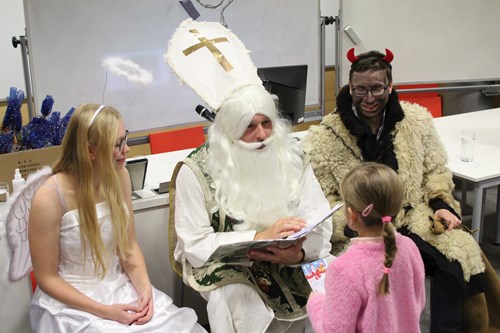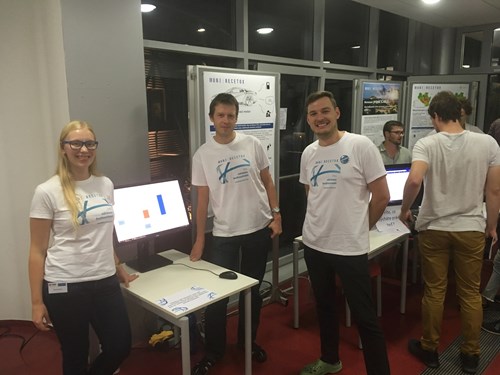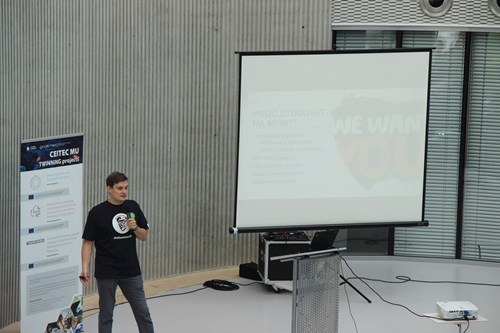Jaromir, why Ph.D. studies?
That's a great question. I really enjoyed my master's studies and working on my thesis, even though the topic was somewhat challenging (note: Equilibrium passive sampling of persistent organic compounds in freshwater fish tissues). Even during the final study year, I sometimes thought I would like to learn even more, so I decided to apply for the Ph.D.
Did you consider moving to a different city to study for your Ph.D. at another university?
Brno was a clear choice because my family is here and I live nearby. Moreover, why go elsewhere, for example, Prague, when Brno is a leader in science. It is a science hub, and the possibilities for self-fulfillment in science and research are excellent. Prague may have been attractive a few years ago, but now it would be a shame to leave Brno. If you are looking for something in science and research, just look around Brno, and you will find it.
What is the topic of your dissertation; why this one?
(laugh) My research topic is another reason that convinced me to continue studying for a Ph.D. The thesis title is Establishment of a network for long-term monitoring of organic pollutants in an aquatic environment on a global scale. When I was finishing my master’s degree, my advisor, Foppe Smedes, was one of the initiators for setting up a global monitoring network for non-polar organic pollutants in water. In my master’s thesis, I focused on passive sampling, where I dealt with passive sampling of fish but now I examine the water. In addition, I was interested in pollutants in the aquatic environment and in being involved in such a large project. The AQUA-GAPS initiative started in 2016; it gathers information on the spatial distribution and temporal trends of organic contaminants through passive sampling. Passive sampling has proved to be highly applicable in air monitoring networks such as MONET and GAPS; thus, the AQUA-GAPS initiative did not start from scratch but rather used the experience of existing networks.
What did you enjoy about your topic?
I really enjoyed participating in a project that makes sense in the long term. I learned a lot, not only about the lab work but also about project communication and management. It was great to work with people from all over the world on research, exchanging experience, opinions, and data. And also to work with my supervisor, Associate Professor Branislav Vrana, and colleague Foppe Smedes, who are world leaders in passive sampling. It has been a fantastic experience, and I am very grateful for it.
What were your expectations at the beginning of your Ph.D. studies? Did they exceed your initial expectations?
I am very grateful for my supervisor, who clarified what the Ph.D. is about and the possible challenges before submitting the application. Although I knew that I would be working on a project with an international scope, I can only now realize this scope properly. During my studies, I had the opportunity to attend international conferences and meet other professionals and scientists. I wouldn´t have met them if I hadn´t applied for the Ph.D. Plus, I didn´t expect to improve my English and communication skills and learn so much about passive sampling.
What was the biggest challenge for you during your studies?
Every student experiences moments during their studies that are not ideal. For example, some research processes and communication with foreign partners take longer than you expect. If you want quality results and collaboration, you must learn to be patient. I believe that everyone experiences that moment during the Ph.D. when they wonder if it all makes sense and if it would be better to quit.
Did you have an opportunity to study abroad or stay on an internship abroad?
During my master’s studies, I went to Svalbard as part of my research project; I took the “Arctic Technology - Techniques for the Detection of Organochemical Pollutants in Arctic Environments” course with students from other countries. It was great there, I learned a lot, and it was fascinating doing fieldwork during polar night. As part of my Ph.D., I went to international conferences in Dublin, Ireland, and Thessaloniki, Greece. I also participated in a workshop on passive sampling in Lausanne, Switzerland. During my third year, I went to Brisbane, Australia, for two months to work in our close colleagues' QAEHS (Queensland Alliance for Environmental Health Sciences) laboratories. But I only stayed in Australia for three weeks instead of two months because of the coronavirus pandemic. Australia immediately went into a strict lockdown. The only way to get out of your flat was to do your grocery shopping. The university labs were closed; the most you could do was sit at home and see your colleagues online, so I decided to return home after three weeks. I arrived on one of the last commercial flights, and Australia remained in lockdown for a long time after that.
Do you have a favorite scientist working on the same topic whose work you follow regularly?
Overall, I am interested in the results and work of anyone working on passive sampling. But my passive sampling guru is Kees Booij, and also Foppe Smedes, who works at RECETOX. And, of course, my supervisor Brano Vrana.
Throughout your doctoral studies, you actively participated in extracurricular and leisure activities at RECETOx, e.g., St. Nicholas' Day party, bike preparation workshop for the new season. What are your favorite memories from the joint events?
I remember that St. Nicholas Day was the first one, and it was back when I was studying for my Master's degree. At RECETOX, there was a tradition to organize St. Nicholas Day because many foreigners can get in touch with Czech traditions this way. Still, it is also great fun for the Czech employees before the end of the year.
One of my colleagues from the lab asked me if I would like to be St. Nicholas because she didn't have anyone for that year and, as she said, the tradition needed some young blood. (Laugh) Since high school, I've been doing St. Nicholas with my friends, and I thought, why not actually. I didn't expect it would be such a success and certainly not that the tradition would even grow. The following year, they would have St. Nicholas for the employees' children. I know I didn't feel quite up to it at my twenty-five at the time, but a year later, I was doing St. Nicholas for the kids at this event as well.
And I've been involved in extracurricular activities since my days at high school; I like to be active and face a challenge, so it was natural for me to help organize Researchers' Night, a bike repair workshop, or an online lecture Science-to-go about water contamination.
And how was the filming of the documentary report on passive sampling for the Restart Byznys program on Czech Television?
That was a great opportunity and a completely new experience. It was especially nice to experience a shoot led by a director who knew exactly what she wanted to see. (laugh) In advance, she was familiar with our topic, so it was done in 6 hours. And I guess I'm lucky that I'm pretty communicative, so I wasn't afraid to talk on camera. (laugh)
Jaromir, thank you very much for the interview. We're so glad you found the time to talk with us before your Ph.D. exams, and fingers crossed that everything goes well. And we also wish you the best of luck in your new job.







